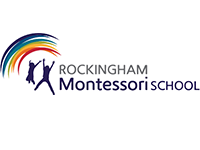Rockingham Montessori School

Phone Number: 9528 2118
Address:
7 Attwood Way, Rockingham, 6168
Website: https://rms.wa.edu.au/
One of the Leading Independent Schools in Perth
Rockingham Montessori School is an alternative and independent school near the ocean in Rockingham, Western Australia. We are committed to Montessori philosophy and practice and dedicated to providing each of our students with exceptional care. Between our Infant Toddler Program (playgroup), Primary School and Adolescent Program (High School), we provide a genuine Montessori education experience for around 250 children and young people, from 12 months to 18 years of age.
Why Montessori?
Alternative & Montessori Schools Perth
Montessori is an approach to supporting the full development of the human being, inspiring children to a lifelong love of learning by following their natural development trajectory.
At Rockingham Montessori School, our classrooms provide a specially crafted learning environment where children can respond to their innate passion for learning. Children are encouraged to engage in spontaneous, purposeful activities with the guidance of a trained adult. Through their work, the children develop concentration and joyful self-discipline. Within a framework of order, the children progress at their own pace and rhythm, according to their individual capabilities.
Montessori Educators
In a Montessori school, teachers typically have a regular teaching qualification and an additional Montessori teacher education diploma and are traditionally called ‘Directors’, rather than ‘Teachers’.
The Director’s role is that of guide or facilitator, supporting the child in their self-development. They are foremost an observer, unobtrusively yet carefully monitoring each child’s development and recognising their needs. They provide children with a link to the prepared environment. The most important attribute of a Montessori educator is the love and respect they hold for each child’s total being. Montessori Directors become very important figures in the children’s lives. They remain together for three years and a strong relationship is formed between them.
Montessori’s Planes of Development
Montessori classrooms are multi-aged learning environments, based on Dr Montessori’s stage theory of human development, which she called The Four Planes of Development.
In the first plane from birth to age six, the child is characterised by their ‘absorbent mind’, absorbing all aspects of their environment, language and culture. In the second plane from age six to twelve, the child uses a ‘reasoning mind’ to explore the world with abstract thought and imagination. In the third plane from twelve to eighteen, the adolescent has a ‘humanistic mind’ eager to understand humanity and the contribution he or she can make to society. In the last plane of development, from age eighteen to twenty-four, the adult explores the world with a ‘specialist mind’ taking his or her place in the world.
Maria Montessori believed that if education followed the natural development of the child, then society would gradually move to a higher level of co-operation, peace and harmony.
Montessori Classrooms
Montessori classrooms are often called the ‘prepared environment’ and are designed to meet the physical and psychological needs of the child at each stage of development. Furniture and materials are child-sized. The curriculum is embedded in the hands-on materials and activities in the learning environment.
The beauty, order and accessibility in the classroom entice the child to engage with the activities according to their individual interests and at their own pace. In this way learning becomes highly personalized.
At the same time, the child learns to interact socially. The three-year age range enables older children to teach the younger and learn from this experience while the younger children are inspired to more advanced work through observing the older ones. With a variety of levels, each child can work at their own pace, unhindered by competition and encouraged by co-operation.
Key principles of the prepared environment are:
• Independence
• Indirect preparation
• Order
• Choice
• Freedom
• Mixed age range
• Movement
• Control of error
• Materials
• Role of the adult
Montessori Materials
‘Nothing goes into the mind that does not first go through the hands’ (Dr Maria Montessori).
Montessori materials embody the learning curriculum and are designed to stimulate the child into logical thought and independent discovery. They are provocative, enticing and simple to use. However, beneath the beauty and simplicity, lies a deep intentionality. Each is designed to meet one or more specific needs of the child, and each material has been developed in the context of all the other materials. Each has what is known as a ‘control of error’. If the child has done something incorrectly it will be self-evident. The geometric shape, for example, won’t fit the hole, or the water will spill on the table. Being able to see his or her own mistake allows the child to work independently.


